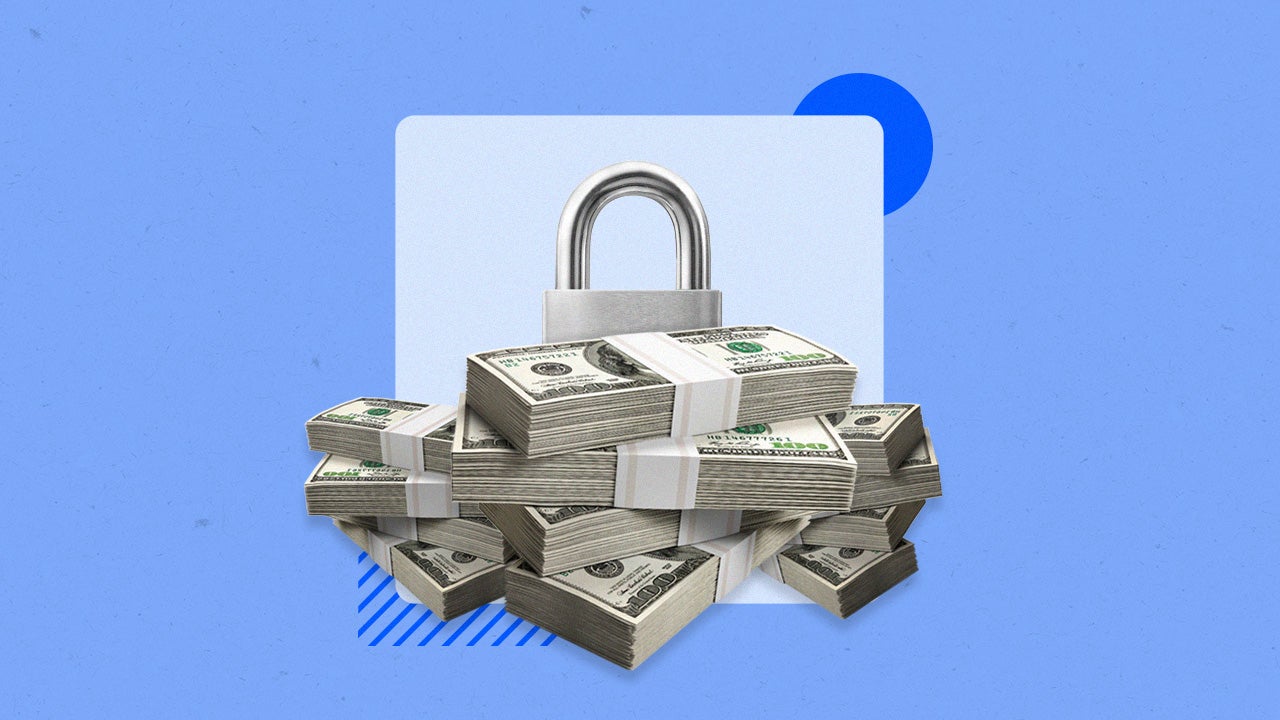Are CDs safe?

Key takeaways
- CDs issued at federally insured banks and credit unions are protected by federal deposit insurance, meaning your money is protected up to $250,000 per depositor, per insured institution, per ownership category.
- CDs from online-only banks can be just as safe as CDs from brick-and-mortar banks, as long as the online bank is federally insured and takes basic security measures.
- If you withdraw your funds before the CD maturity date, you’ll likely get hit with an early withdrawal penalty, causing a loss of interest and maybe even a portion of the principal amount.
Certificates of deposit (CDs) are accounts that typically pay a guaranteed rate of return for a set period of time. CDs come in a wide range of terms and interest rates, but all CDs share one common component: They are one of the safest places to park your cash.
Are CDs guaranteed? How Federal insurance keeps CDs safe
Like savings and checking accounts, most CDs are protected by deposit insurance, meaning your funds are insured by the Federal Deposit Insurance Corp. (FDIC) at a bank and the National Credit Union Administration (NCUA) at a credit union.
“That insurance is there in case a bank runs into financial trouble, which doesn’t actually happen all that often,” says David Sterman, CFP, president and CEO of New York-based Huguenot Financial Planning.
Such insurance only covers $250,000 per depositor, per insured bank or credit union, per ownership category (such as an individual or a joint account). Unless you have accounts in more than one ownership category, your individual deposits should not equal more than $250,000 at any one bank, or else anything in excess of that limit will be uninsured.
To be clear, opening several accounts under the same name at the same bank won’t increase your coverage unless the accounts are within different covered, ownership categories. For example, a single-owner account is different than a joint account. You could have $100,000 in a single-owner savings account and $250,00 more in a joint savings account, and all of your money would be FDIC-insured.
If you’ve got more than $250,000 that you want to keep in deposit accounts, you have options to insure money that will put you over the standard FDIC and NCUA insurance limits.
How to check if your CD is federally insured
To be sure that your CD’s funds will be insured, you can use the FDIC’s BankFind tool to look up the institution and verify it is part of the FDIC’s network.
Likewise, the NCUA offers a Research a Credit Union tool that provides credit union details and verifies insurance. An exception to this may be fintechs.
Sometimes, non-bank fintech companies (like Betterment, for example) offer banking services through partnerships with chartered banks. In that case, your money is protected in the event of the partner bank’s failure through what’s known as pass-through deposit insurance. If the non-bank company fails though, your money will not be federally insured and you’ll have to work to recover your funds through other means, such as bankruptcy proceedings. In this case, you are not guaranteed to get all your funds back.
How safe are online CDs?
Using an online bank for CDs and other deposit accounts can be just as safe as using a brick-and-mortar bank, as long as the online bank is federally insured and takes basic steps to protect your information
A bonus of CDs from online banks is they often earn a higher annual percentage yield (APY) than those offered by brick-and-mortar banks.
Just make sure your online bank does the following to protect your accounts:
- Encryption: Encryption technology can protect your username, password and other information. You’ll know it’s in place when there’s a lock symbol next to the bank’s web address in your browser.
- Multi-factor authentication: This two-step process can add a layer of security. In addition to entering a username and password, multi-factor authentication asks you to confirm your identity through a second factor. That could be a code that’s texted or emailed to you, or approval through an authenticator app, for example.
“To get the best CD yields, you may need to shop online as local bank branches may not offer the market-leading yields, though it pays to inquire at your local bank branch and compare,” Sterman says. “Those online CD vendors, such as Ally or Capital One, carry the same FDIC insurance, so there is no risk in banking with them.”
Why should you think about opening a CD?
CD’s are a safe place to stash your money, and they offer a guaranteed rate of return.
In today’s falling interest rate environment, now might be a good time to open up a CD. The Federal Reserve cut interest rates a few times in 2024. Experts expect to Fed to continue to cut rates in 2025, though probably at a slower rate. That means that opening a CD and locking in today’s higher interest rates can be a smart move.
But before opening an account, consider your goals for the money you’re placing in the CD, including when you’ll want access to the funds.
“Using a CD to save for retirement is not a great idea since you may not need the money for decades,” says Chris Reddick, CFP, and owner of Texas-based Chris Reddick Financial Planning. “But if you want to buy a new car or other big purchase in a year or so it might be best to get a CD.”
Huguenot Financial Planning’s Sterman says CDs are often a great place to set aside funds that won’t be needed for a year or two. “They’ll garner more interest than a regular checking or savings account would, and unlike the stock market, you’re assured that the money will be there when you need it.”
Consider inflation when opening a CD
Another consideration when placing your savings in any account is inflation. If possible, you always want to be sure your money’s return is outpacing inflation. Otherwise, your money becomes less valuable over time.
The inflation rate is 2.9 percent as of January 2025 — much better than 2022’s peak at 9.1 percent. And though rates are falling, the best CD rates are still beating inflation, making them worth considering by savers.
“Any time you can lock in a CD at a return that is above the rate of inflation, you have to consider it,” says Greg McBride, CFA, Bankrate’s chief financial analyst. “Just be sure to only commit to a CD where you are certain you don’t need the money until maturity.”
To maximize CD interest earnings, savers would do best to select one that pays a significantly higher yield than the national average, which often means opening a CD with an online-only bank. Without the expense of maintaining branches, online banks may pass along the savings to customers in the form of higher rates.
Relatively safe alternatives to CDs include low-risk mutual funds — as well as Treasury Inflation-Protected Securities, or TIPS, which have an effective interest rate that moves up or down along with inflation.
See more: Current certificate of deposit rates
Can you lose money on a CD?
CDs are typically regarded as secure investments, although you can indeed lose money under certain circumstances. If, for example, you decide to withdraw from a CD prior to its maturity date, you’ll likely be hit with an early withdrawal penalty. This could equate to several months’ worth of interest. In some cases, the penalty could potentially surpass the interest you’ve accumulated, leading to a reduction in your original deposit — effectively causing a loss.
However, as long as you comply with the CD’s requirements until it matures, and your CD provider carries federal deposit insurance, your money is protected up to $250,000 per depositor, per insured bank or credit union, per ownership category.
What if I need to withdraw my money early from a CD?
Withdrawing from a CD before its maturity date usually incurs a penalty, which is often the loss of interest that the CD has accrued over a certain period. This penalty can vary among banks and is generally influenced by the term length of the CD; those with longer terms are likely to have steeper penalties than those with shorter terms.
If you withdraw your money from a CD too early, the penalty might even dip into the principal amount, resulting in the loss of a portion of your original deposit. It’s important to note that most banks don’t permit partial withdrawals, so accessing the money early would mean forfeiting the remaining potential interest, on top of paying the penalty.
Ways to avoid paying a CD’s early withdrawal penalty include only devoting money to a CD that you’re comfortable parting with for the entire term. Alternately, you could opt for a no-penalty CD, or deploy a CD ladder strategy which allows access to some of your funds at intervals.
Bottom line
CDs are one of the safest ways to store money and earn a set rate of interest, which can help you better plan your finances. CDs opened at FDIC-insured banks, or credit unions backed by the NCUA, are guaranteed by the federal government. Should the bank or credit union fail, your savings won’t be lost, as long as you’re within deposit limits.
–Freelance writer David McMillin contributed to a previous version of this article.
Why we ask for feedback Your feedback helps us improve our content and services. It takes less than a minute to complete.
Your responses are anonymous and will only be used for improving our website.







